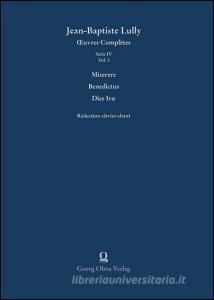
Miserere, Benedictus, Dies Irae
Série IV: Motets, Volume 3. Édition de Jean Paul C. Montagnier. Réduction clavier chant: Noam A. Krieger.
- Editore:
Olms Georg AG
- EAN:
9783487155845
- ISBN:
3487155842
- Formato:
- Paperback
- Lingua:
- Tedesco
Descrizione Miserere, Benedictus, Dies Irae
Bien que Jean-Baptiste Lully n'ait jamais exercé de fonctions officielles à la Chapelle de Louis XIV, il ne composa pas moins de douze motets à grand choeur (ou grands motets), participant ainsi à l'élaboration d'un genre promis à un brillant avenir. Le Miserere (LWV 25) fut semble-t-il chantée pour la première fois à Paris en l'église des Feuillants de la rue Saint-Honoré, lors de la Semaine Sainte de 1663. Lully livra avec cette partition l'un des premiers modèles achevés du motet à grand choeur et dont Madame de Sévigné déclara qu'« Il y a eu un Libera où tous les yeux étaient pleins de larmes. Je ne crois point qu'il y ait une autre musique dans le ciel ». Jérôme de La Gorce situe la rédaction de ce Benedictus vers 1663 ou 1664. Nous n'avons trace d'aucune exécution du vivant de son auteur. Quant au Dies iræ (LWV 64/1), il fut composé pour les funérailles de la Reine Marie-Thérèse et chanté à Saint-Denis le 1er septembre 1683.****************Although Jean-Baptiste Lully never exercised any official function within the chapel of Louis XIV, he composed no fewer than twelve concerted motets for a large choir (grands motets) thus sharing in the development of a genre which was to have a brilliant future. The Miserere (LWV 25) was sung for the first time in Paris in the church of the Feuillants in the Rue Saint-Honoré in the Holy Week 1663. It is one of the first completed examples of a motet à grand chæur, and of which Madame de Sévigné declared that "Il y a eu un Libera où tous les yeux étaient pleins de larmes. Je ne crois point qu'il y ait une autre musique dans le ciel". The Benedictus was written around 1663 or 1664, there being no record of any performance during the composer's lifetime. The Dies irae LWV 64/1 was composed for the funeral of Queen Marie-Thérèse and performed at Saint-Denis on 1 September 1683. This first historical-critical edition is based on a study of all surviving sources. As well as full scores, each of which will include a printout of the libretto, performance material and piano scores of the dramatic works and the sacred music will also be published.

